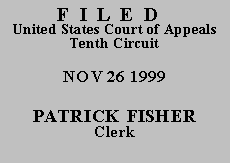

| RICHARD C. WHITE, | |
| Petitioner - Appellant, | |
| v. | |
| LARRY EMBRY, Warden, and ATTORNEY GENERAL OF THE STATE OF COLORADO, | |
| Respondents - Appellees. |
This case is before the court on Richard C. White's pro se application for a certificate of appealability and his motion for leave to proceed on appeal in forma pauperis.
Petitioner was convicted in Denver District Court in 1993 of sexual assault on a child, sexual assault by a person in authority, and intimidating a witness. He was sentenced to ten years in prison. After his direct appeal and writ of certiorari were denied by the state courts, Petitioner filed a post-conviction motion pursuant to Rule 35(c) of the Colorado Rules of Criminal Procedure. The state trial court denied the motion without a hearing, but the appeals court reversed and remanded for an evidentiary hearing. On remand, the state trial court conducted the evidentiary hearing and then, on December 11, 1998, it denied Petitioner's Rule 35(c) motion a second time.(1) He thereafter filed this petition for a writ of habeas corpus under 28 U.S.C. § 2254 in the United States District Court for the District of Colorado.
In the habeas corpus petition, Petitioner raised five claims alleging numerous violations of his Fifth, Sixth, and Fourteenth Amendment rights. While he alleged that four of his five claims were raised in his Rule 35(c) post-conviction motion, there is no evidence in the record that Petitioner appealed the state trial court's December 11, 1998 denial of the Rule 35(c) motion. The magistrate judge ordered Petitioner to show cause why the habeas corpus petition should not be denied as a mixed petition because it raised claims that were not exhausted in state court. After considering Petitioner's response to the show cause order, the district court carefully reviewed each issue raised and dismissed the petition without prejudice, finding that Petitioner did not directly appeal the denial of the Rule 35(c) motion and holding that Petitioner had failed to exhaust four of the five claims without cause. The district court also held that Petitioner had produced no new evidence to establish actual innocence and show that a fundamental miscarriage of justice would result. In addition, the court held that the first claim, the violation of the right to a speedy trial, was without merit because any delay was not attributable to the court. As a result of its dismissal of the habeas corpus petition without prejudice, the district court denied Petitioner's application for a certificate of appealability and his motion for leave to proceed on appeal in forma pauperis. This appeal followed in which Petitioner argues that the facts support his claim of a speedy trial violation and they should excuse the exhaustion requirement.
Having thoroughly examined Petitioner's application for a certificate of appealability, his brief, and the record in this case, we conclude that the record and the law fully support the district court's Order and Judgment filed June 14, 1999. For the reasons set forth therein and because Petitioner has not made a substantial showing of the denial of a constitutional right, we deny the renewed application for a certificate of appealability and the motion for leave to proceed on appeal in forma pauperis and dismiss the appeal.
DENIED and DISMISSED.
Entered for the Court
Monroe G. McKay
Circuit Judge
*. This order and judgment is not binding precedent, except under the doctrines of law of the case, res judicata, and collateral estoppel. The court generally disfavors the citation of orders and judgments; nevertheless, an order and judgment may be cited under the terms and conditions of 10th Cir. R. 36.3.
1.While the Rule 35(c) motion was pending in state court, Petitioner filed a § 2254 petition for writ of habeas corpus, which was denied as a mixed petition for failure to exhaust certain claims. See White v. McKinna, 153 F.3d 730, 1998 WL 396561 (10th Cir. 1998).